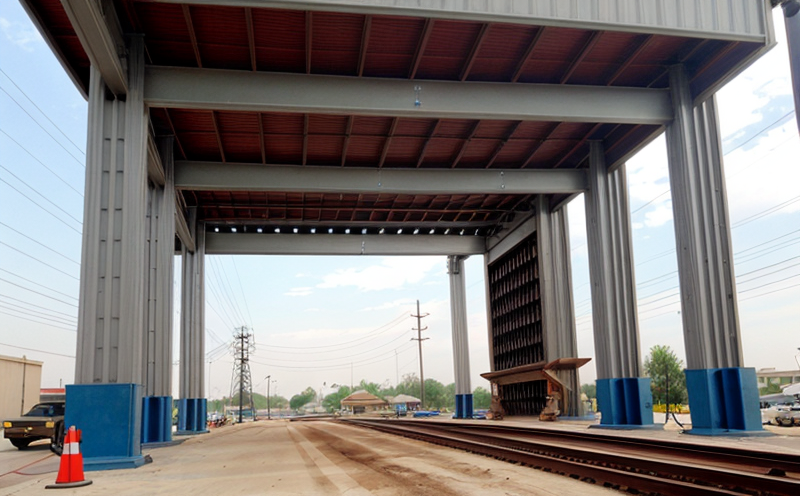ASTM D7774 Flexural Fatigue Testing of Composites
The ASTM D7774 flexural fatigue testing method is a critical procedure used to evaluate the durability and performance of composite materials under cyclic loading conditions. This test is essential for aerospace and aviation industries where structural integrity must be guaranteed, especially in components subjected to dynamic loads such as wings, fuselage parts, and landing gear.
During ASTM D7774 testing, composite specimens are subjected to repeated bending stress cycles until failure occurs. The test aims to determine the fatigue life of the material by quantifying the number of cycles it can withstand before experiencing structural damage or fracture. This information is invaluable for predicting the service life of components in operational environments.
The testing procedure involves precise specimen preparation, which includes shaping and curing composite materials according to ASTM standards. The specimens are then subjected to controlled bending stress using a specialized fatigue tester equipped with a high-precision load cell. The test setup ensures that the loading direction aligns perfectly with the principal axes of the composite material.
The acceptance criteria for ASTM D7774 testing include the number of cycles-to-failure, which is determined by monitoring the specimen's behavior during each cycle until failure. Additional parameters such as stress intensity factor (SIF) and strain rate are also measured to provide a comprehensive understanding of the material's fatigue properties.
Accurate reporting of test results is crucial for compliance with aerospace industry standards. Our laboratory adheres strictly to ASTM D7774 guidelines, ensuring that all testing data is reported in accordance with international best practices. This includes detailed documentation of specimen preparation, test parameters, and observed behavior during the fatigue cycles.
The flexibility of ASTM D7774 allows for modifications to accommodate various composite types and configurations. This adaptability makes it a versatile tool for material developers and engineers looking to optimize composite designs for aerospace applications.
Our laboratory offers state-of-the-art facilities equipped with advanced instruments capable of performing ASTM D7774 tests under precise control conditions. This ensures that each test is conducted in an environment that closely mimics real-world operational scenarios, providing reliable data for decision-making processes.
The importance of ASTM D7774 testing cannot be overstated, as it directly impacts the safety and reliability of aerospace components. By leveraging this standardized method, manufacturers can ensure their products meet rigorous quality standards while minimizing risk associated with material failure.
| Applied Standards | Description |
|---|---|
| ASTM D7774-18 | Standard Test Method for Flexural Fatigue Properties of Polymer Matrix Composites |
| ISO 12203:2006(E) | Plastics - Determination of fatigue properties by four-point flexural tests |
Why It Matters
The durability and reliability of composite materials are paramount in the aerospace industry, where components must withstand extreme conditions over extended periods. ASTM D7774 testing plays a vital role by providing insights into how these materials behave under cyclic loading, which is crucial for ensuring long-term performance.
- Ensures compliance with strict regulatory requirements
- Supports ongoing R&D efforts to improve composite material properties
- Aids in optimizing design parameters for better performance and safety
The data obtained from ASTM D7774 testing allows manufacturers to make informed decisions regarding material selection, process optimization, and product development. This ultimately leads to safer, more efficient aerospace products that can operate reliably under demanding conditions.
By incorporating ASTM D7774 results into their design processes, companies can reduce the risk of premature failures and enhance overall system reliability. This is particularly important in applications where component failure could have serious consequences, such as aircraft structures or engine parts.
The importance of ASTM D7774 testing extends beyond just meeting regulatory requirements; it also contributes to advancing the state-of-the-art in composite material technology. As manufacturers push boundaries and explore new materials, ASTM D7774 provides a benchmark against which performance can be measured and compared.
Applied Standards
| Standard Name | Description |
|---|---|
| ASTM D7774-18 | Standard Test Method for Flexural Fatigue Properties of Polymer Matrix Composites |
| ISO 12203:2006(E) | Plastics - Determination of fatigue properties by four-point flexural tests |
The ASTM D7774 method is widely recognized for its accuracy and reliability, making it a preferred choice in the aerospace sector. Compliance with this standard ensures that test results are valid and can be confidently relied upon when making decisions about material performance.
Industry Applications
The ASTM D7774 flexural fatigue testing method finds extensive application across various aerospace components, including:
- Fuselage structures
- Wing assemblies
- Landing gear systems
- Propeller blades
In these applications, the ability to withstand repeated loading cycles without failure is critical. By subjecting materials to ASTM D7774 testing, manufacturers can ensure that their products meet stringent durability and reliability requirements.
| Industry Applications | Description |
|---|---|
| Fuselage Structures | Ensures structural integrity under cyclic loads during flight operations |
| Wing Assemblies | Evaluates fatigue resistance in high-stress areas of the wing |
| Landing Gear Systems | Guarantees safe landing and takeoff by preventing component failure |
| Propeller Blades | Avoids blade fractures during long-term service in turbulent environments |
The versatility of ASTM D7774 testing allows it to be adapted for use with different composite materials and configurations, making it a valuable tool across the aerospace industry.





